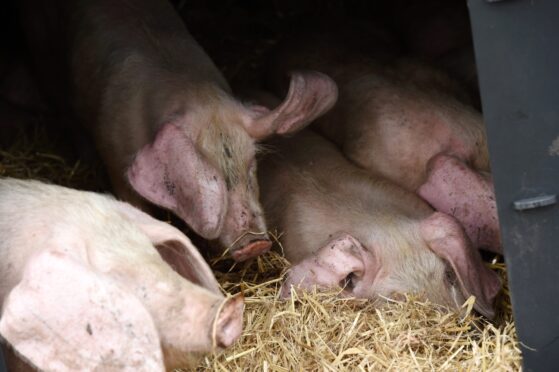The chief executive of Scottish Pig Producers is calling for stricter measures on border controls to prevent African Swine Fever (ASF) from entering the UK.
Andy McGowan, who is also a QMS board member, says the levy board has put various strategies in place to safeguard the industry against the threat of ASF which is believed to have killed a quarter of the world’s pig population.
He said ASF is the biggest animal disease outbreak ever recorded and poses a “very real threat” to Scotland’s pig industry.
Highlighting the importance of border controls, Mr McGowan expressed deep concerns over existing regulations that could potentially allow the virus to enter the UK.
He stressed the need for stricter measures to prevent the introduction of ASF through commercial and personal imports of pork products.
ASF poses a “very real threat” to Scottish pig industry
“Our goal is to keep it out of the country but we are also preparing for the possibility of an outbreak and working on contingency plans to minimise its impact,” said Mr McGowan.
“Border controls in the UK are woeful. Having been delayed for seven years due to Brexit, veterinary certificates are now required for commercial imports, but they aren’t being checked.
“Unlike Europe, the UK still permits individuals to bring in up to 2kg of pork products for personal consumption. That is being tested and positive results show some does contain viable ASF.
“Across the world we’ve seen this virus spread primarily through wild boar accessing infected food products. It is essential that we minimise the likelihood that the wild boar and feral pigs in Scotland encounter contaminated food.”
SPP chief says border controls in the UK are “woeful”
Research indicated that the chances of ASF spreading from one infected pig farm to another is around 0.2% while the risk of an infected wild boar or feral pig spreading the disease to an outdoor farm is closer to 50%.
Alongside preventative actions, Mr McGowan said a coordinated approach plan involving testing, culling, and movement controls would need to be put in place in response to an outbreak.
“Often the secondary impact of a disease outbreak is greater than the primary,” he said.
“With foot and mouth, for example, 80% of the financial losses were through the tourism sector and wider rural economy.
“While I don’t think an outbreak of ASF would have the same impact on tourism businesses, the knock-on effects for the supply chain and other producers in the rest of the UK would be significant.”
In addition to participating in international efforts, QMS has taken proactive steps at the domestic level including the formation of a ‘Feral Pig Working Group’.
Bruce McConachie, head of industry development at QMS, says the levy board is routinely taking samples in abattoirs checking for diseases and following-up with investigations on farm to support producers.

